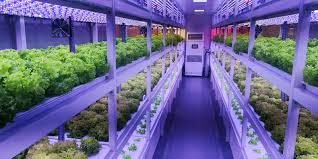Improving Public Health: The Nutritional Impact of Fresh Container-Farmed Produce
"Improving Public Health: The Nutritional Impact of Fresh Container-Farmed Produce"
Christopher Hebb
9/2/20245 min read


Understanding Container Farming
Container farming is an innovative agricultural method that utilizes controlled environments to produce fresh produce in a sustainable and efficient manner. This technique typically involves the use of shipping containers or specially designed modular units that house various growing systems, from hydroponics to aeroponics, thereby optimizing space and resource utilization. By creating an environment conducive to plant growth, container farms can control variables such as light, temperature, humidity, and nutrient delivery, which significantly enhances yield while minimizing the impact on the surrounding ecosystem.
One of the primary technological bases of container farming is its implementation of advanced agricultural technologies. These may include automated monitoring systems and sensors that track plant health and environmental conditions in real-time, allowing for precise adjustments to be made as needed. As urban populations continue to grow, the adoption of container farming becomes increasingly relevant, providing a viable solution to food production challenges in densely populated regions. By deploying these farms in urban environments, cities can benefit from a localized food source, reducing transportation costs and emissions associated with traditional farming.
Container farming also excels in its efficient use of resources, particularly water. Traditional agriculture often relies on extensive irrigation systems that can lead to water waste and depletion of local water sources. In contrast, container farms implement closed-loop systems that recycle water, significantly reducing overall consumption. Additionally, the controlled environment allows for the complete elimination of pesticides, as the enclosed systems prevent pest infestations while promoting healthy crop growth. These advantages make container farming an attractive alternative, especially in urban settings where arable land is scarce and environmental concerns are at the forefront of agricultural discussions.
The Nutritional Benefits of Fresh Produce
Fresh produce plays a pivotal role in public health, providing essential vitamins, minerals, and antioxidants that are often lacking in processed foods. Fruits and vegetables are rich in dietary fiber, which aids digestion and helps to maintain healthy body weight. The consumption of fresh produce has been associated with a reduction in chronic diseases such as obesity, heart disease, and diabetes. Studies indicate that individuals who have greater access to fresh fruits and vegetables often experience better health outcomes compared to those who primarily consume processed food items.
The vitamins found in fresh produce, particularly Vitamin C and various B vitamins, are crucial for immune function and energy metabolism. For instance, Vitamin C is known for its antioxidant properties, helping to neutralize harmful free radicals and mitigate oxidative stress. Similarly, B vitamins are involved in energy production and red blood cell formation, thereby supporting overall bodily functions. Minerals such as potassium, found abundantly in bananas and leafy greens, are vital for regulating blood pressure and maintaining heart health.
Additionally, antioxidants—compounds found in colorful fruits and vegetables—play a significant role in combating inflammation and reducing the risk of chronic diseases. For example, lycopene in tomatoes and beta-carotene in carrots have been linked to reduced risk factors for conditions like cardiovascular diseases. Accessibility to fresh produce, particularly in urban areas plagued by food deserts, directly correlates with improved health outcomes. When communities have greater access to these nutritional food sources, they demonstrate lower incidences of diet-related health issues.
In essence, the nutritional benefits of consuming fresh produce are profound. Fresh fruits and vegetables provide essential nutrients that not only support individual health but also contribute to the overarching goal of improving public health throughout communities, particularly where agricultural access may be limited.
Impact on Urban Populations and Food Security
Urban populations often face significant challenges regarding food security and access to fresh produce. As cities grow and develop, many residents, particularly in low-income areas, encounter barriers that limit their ability to procure healthy, nutritious food. Factors such as high living costs, food deserts, and a lack of transportation options exacerbate this issue, leading to an increased reliance on convenience stores that typically offer processed foods rather than fresh options. Consequently, urban communities often experience high rates of diet-related diseases, including obesity, diabetes, and cardiovascular conditions.
Container farming presents a promising solution to these challenges by establishing localized food production systems capable of delivering fresh produce directly to urban populations. These innovative agricultural practices allow for the cultivation of nutrient-dense crops in controlled environments, minimizing the distance between farm and consumer. As a result, container farms can significantly enhance food security by providing a stable source of fresh fruits and vegetables, thereby encouraging healthier eating habits among urban residents.
Moreover, container farming has the potential to transform underutilized urban spaces into productive areas of food growth. This transformation can lead to community engagement in agricultural activities, where residents not only consume but sometimes participate in the growing process. Education surrounding nutrition and sustainable practices can also emerge from these initiatives, empowering individuals to make healthier food choices and understand the significance of produce in their diets. By addressing the challenges of food availability and accessibility, container farms help mitigate the impact of food deserts and promote better public health outcomes.
The integration of container farming into urban environments illustrates a beneficial shift towards enhancing food security, which is paramount in densely populated areas. This innovative approach to agriculture not only supplies fresh produce but also fosters community resilience against diet-related health issues that can emerge from inadequate access to nutrient-rich foods.
Future of Container Farming and Public Health Initiatives
As the global population continues to rise, the need for sustainable food production methods is becoming increasingly urgent. Container farming—an innovative agricultural technique that employs controlled environments in shipping containers—has emerged as a promising solution to meet this demand while simultaneously addressing public health concerns. Ongoing research into container farming illustrates its potential to improve access to fresh produce, particularly in urban areas where food deserts are prevalent. Studies indicate that these farms can produce higher yields than traditional farming methods, fostering food security and offering affordable, nutritious options to underserved communities.
Urban planning considerations play a critical role in the success of container farms in local food systems. Policymakers must prioritize the integration of agricultural solutions into urban development plans. This includes zoning regulations that support the establishment of container farms within city limits, as well as incentives for businesses and individuals to invest in this clean and efficient form of food production. Furthermore, community engagement efforts are essential for fostering public interest and participation in container farming initiatives. Local outreach programs can educate residents about the benefits of fresh produce, promote healthy eating, and encourage volunteer opportunities at community farms, strengthening social ties and enhancing community well-being.
Successful case studies across various cities provide compelling evidence of the positive impact container farming can have on public health initiatives. In some communities, container farms have not only increased the availability of fresh fruits and vegetables but have also served as educational hubs for nutrition and sustainability. These projects demonstrate that when urban planners and policymakers collaborate with local organizations, there is significant potential to develop effective strategies that contribute to public health improvements. Recommendations to support this innovative food production approach include investing in research, prioritizing community education, and creating partnerships between stakeholders to create a robust framework for container farming initiatives moving forward.
© 2025. All rights reserved.







